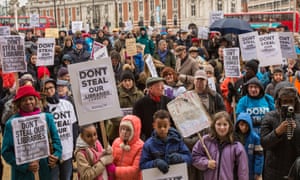
A brutal year for the UK’s public libraries has been topped off with the revelation that the sector took a £25m hit to its budgets in the year to March, as calculated in official figures released on Wednesday. The number of public libraries still open reached a 10-year low, while visitor numbers slid by 15 million. Book budgets were also severely hit, taking an 8.4% fall over the period. Critics claimed the cuts endanger the long-term survival of the sector.
The Chartered Institute of Public Finance and Accountancy (Cipfa) released the figures as part of its annual survey of library authorities in the UK. They revealed that total expenditure for the sector fell from £944m to £919m over the year, a 2.6% fall that reflects swingeing cuts by local authorities seeking to shore up frontline services by raiding library budgets. Over the same period, visitor numbers fell to 250 million as 121 libraries closed, taking the total number still open down to 3,850.
The figures arrived a week after a government-appointed taskforce published a report outlining a national strategy to turn around a long-term decline in libraries in England. A £4m innovation fund for projects to help disadvantaged communities was among the schemes outlined in the Libraries Deliver report.
Writer and president of the Society of Authors, Philip Pullman described the latest news as like “witnessing the slow death of civic decency”.
“Libraries are a great and much-loved treasure, and to see them being gradually starved of funds is like seeing a member of the family dying a slow death from some awful disease, for the want of a remedy that’s efficacious and infallible and easy to administer, but which someone is holding deliberately and malevolently just out of reach,” Pullman said. “Every MP, every government minister, every local councillor should be forced to wear a badge of shame if they let libraries die—and no, I’m wrong: I know local government officers who passionately want to preserve the library system, but who can’t because of the merciless cuts in funding. The rot starts at the head in this case. We must preserve our library system, and not just preserve it, but allow it to develop and expand and flourish.”
The annual survey echoes a five-year trend. Libraries suffered a 14% reduction in total net expenditure, from £979m in the year to March 2012 to £842m in the latest year. Meanwhile, there have also been 16.4% fewer visitors in five years, from 299 million in 2011/12 to 250 million in 2015/16.
Announcing the figures, Cipfa’s chief executive Rob Whiteman said: “This fall in library funding comes at a time of unprecedented budgetary pressures for local councils. In this climate, really tough decisions are having to be made about all sorts of services, and libraries are just one of the services bearing the brunt.”
Under the 1964 Public Libraries and Museums Act, local councils have a statutory duty “to provide a comprehensive and efficient library service for all persons”. But enforcement of the law has been weak.
The figures have come soon after a meeting between libraries minister Rob Wilson and the leaders of Swindon Council, to discuss proposed closure of 10 of the council’s 15 libraries. A source told The Guardian: “He is concerned about the proposed cuts and is not ruling out referring the council to an inquiry under the terms of the 1964 act.”
Any hopes that libraries might escape further cuts were quashed by Ian Stephens, chairman of the Local Government Association’s culture, tourism and sport board. Pointing to a 40% reduction in core central government funding for local authorities over the last parliament, he told the Guardian that funding pressures would continue over the next few years. He added: “This means library services must continue to adapt and change in line with the resources available, and the changing expectations of their communities.”
Librarians laid blame for the accelerated decline of the sector firmly at the feet of central government. Nick Poole, the chief executive of the Chartered Institute of Librarians and Information Professionals, said: “The government’s response to libraries being among our most used and trusted public services is to cut budgets and hollow out services.”
He described the autumn statement as a missed opportunity to invest in innovation and growth through the library network. “If HM government wants to create an economy that works for everyone, we need to urgently address the skills and literacy crisis facing this country. It is now essential that libraries are given support and investment through the spring budget.”
Labour shadow culture secretary Kevin Brennan added to the criticism and described the fall in library spending as “staggering” and a direct result of the government’s policy of starving local councils of the resources they need: “In its own Libraries Taskforce report, a five to one benefit to cost ratio is quoted as the return on investment in libraries. This government’s approach is endangering the availability of good local libraries right across the country.”
The main plank of government policy towards libraries is to shift them into the voluntary sector. This shift in strategy is reflected in the new Cipfa figures: though paid library staff fell by 5.3% from 18,028 to 17,064, volunteer numbers rose by 7.5% to 44,501.
A DCMS spokesperson said: “Libraries are hugely important community assets and we are absolutely committed to helping them flourish and prosper in the 21st century. That is why the Libraries Taskforce has published a strategy for the service in England to ensure they are more resilient and better utilised by local authorities.”
[Source:- Gurdian]










